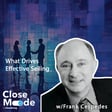Introduction to Navigating Procurement
00:00:03
Speaker
Welcome back to Close Mode. I'm Dan Sanchez and I'm here with Brian Deepmeyer, the host of the show. But now I get to turn the tables again and I get to be the host of the show as normally I'm the guy behind the curtain, the producer that Brian and sometimes the guests call and make fun of live on the show. But it's fun to get on
Challenges in Sales Negotiations
00:00:22
Speaker
the other side. And I've said this before, but I'm excited to dive into this topic because we were just talking about it with another guest and I was like, oh, that's a topic in and of itself.
00:00:31
Speaker
And that is how to navigate procurement as a sales force, because oftentimes procurement at the very end of the sale cycle, when you think you got this thing in the bag, procurement literally sandbags your bag. It's just like, hello, no, no, start again from the beginning. You think you were at the end, but no, bam, they haven't smacked you and you are back to ground one again.
00:00:59
Speaker
So Brian, how, what do we do to navigate procurement as a Salesforce?
Insights from Brian Deepmeyer's Experience
00:01:04
Speaker
It might be important to sort of start with why I think I have something to say on this. And, you know, I, I ran a negotiation firm with a Harvard professor for years and we worked with sales teams.
00:01:15
Speaker
And then we, we happened to start working with, with buyer teams, all state American airlines, Ford, uh, Chevron. So as a lifelong salesperson, I felt like the Fox in the hen house, right? To be in teaching negotiation to the dark side. Uh, and so I, I learned a lot about how they really function. And, and that's what brought me here. And it's interesting. I ran with a, uh, uh, sort of tech data management company, a really cool session.
00:01:45
Speaker
with four or five of the procurement team from this particular client and
00:01:51
Speaker
probably seven or eight of their global account managers, right? And we were sitting at a conference table and, and we, this was, we just kind of made up with this idea and decided to run with it. And it's like, let's create this, this cross dialogue between buyers and sellers in this organization to learn more about one another.
Improving Buyer-Seller Dialogues
00:02:07
Speaker
One of the coolest things. Yeah. I know you always love takeaways on these. This would be one takeaway that I want to give right at the top of the hour, pull together, you know, maybe just a couple of people from your program and organizations, you know, a couple of your key.
00:02:19
Speaker
account management types or whoever and started.
00:02:22
Speaker
About how what really happens at procurement and when our own company go pull people from their own company from yeah Yeah, because it's it's a safe environment, you know, and so here's an example So we were you know, of course we had a series of questions to guide this discussion and everybody was sort of playing nice You know and sales, you know, I'm sorry. Most salespeople can't stand procurement, right? The you know Terrible enemy. It's the enemy and like oh, I'm gonna have to hand you over to procurement is like duh
00:02:50
Speaker
You know, the, the, the world is over, but so everybody was playing nice. And at one point, I'll never forget one of the GCMs, global customer manager, she stood up and said, you know what really pisses me off when I've been selling to the business for six months and the deals about closed and I get turned over to you guys.
00:03:10
Speaker
And I was like, okay, cool. Now we're actually talking about some stuff here. And the odd thing to me was the procurement folks sort of looked to their left and their right. One, one woman put her head down and sort of shook like this. And the other two were snickering with each other. And I said, what the hell just happened over there? Right? The way you react to that. And they.
00:03:30
Speaker
You know what happens when you sold to the business, the business sends the deal to us to get the deal done. By and large, the worst thing in my life as a procurement person is to get kind of a pre-sold deal turned over from the business because
00:03:49
Speaker
I'm supposed to get this deal done in a way that's economically feasible, you know, and that sort
Understanding Procurement Language
00:03:54
Speaker
of thing. But I don't want to go back and say, you know, that deal you sent to me, I screwed it up. And, but I went and found another one. So that it's, it's understanding. I call this approach, speaking the language of procurement. And you and I should talk about this a little bit, really understanding how procurement functions. That was the first thing that opened up in my mind. I ended up writing a couple books with a supply chain manager on
00:04:16
Speaker
how to, for procurement, how they should negotiate. So we do have some insight in this, but they function so differently. That one reaction from those procurement professionals at that table opened up my eyes. Now, when I hear I'm getting turned over to procurement, there's a big chunk of me that says my deal is getting way down the line.
00:04:36
Speaker
They turned it over to procurement to get the deal done. We can talk about discounting and all that stuff, but they turned it over to get it done. And it's actually a good sign if you know how to talk to procurement and if you know what they really care about.
Shifting the Procurement Conversation
00:04:50
Speaker
That makes sense. Cause if you don't know, then you're winging it and winging, it's probably not going to lead to the optimal results. Right. Because by procurement understands you, they understand sales. Yes. They deal with you guys all the time. These are professional buyers, which means they're always working with salespeople. Yep. And it's, you need to learn their side in order to actually navigate the relationship and do the dance appropriately. Yeah. Yeah. And it's even worse, I think, than you stated, um, because we're not only winging it,
00:05:19
Speaker
In absence of knowing how they really function, we're reacting to and getting anchored on the conversation they want to have, which is lower your price by 10% or your competitor just came in and undercut you by 10. In the absence of really knowing anything about this buying influence, who I, this is another problem. We think about, you know, the business as the buying influences and these people as like a pain in our butt. And there are legit buying influence that have legit concerns and we need to understand those. And if we don't.
00:05:48
Speaker
we're going to react to the conversation they want to have, which is I can get the same thing from someone else cheaper. And in absence of knowing much about them, now they're controlling the entire conversation about where this deals go, which will drive, drive heavily the outcome. Yep. And I've heard it said recently from a friend who works at like an enterprise level company, massive company. And she's like, if I'm sending you to procurement, that means I'm betting like a big piece of my relational equity in my company.
00:06:18
Speaker
Yep on doing this because once it goes to procurement at a big company like It's hard to get through which means you're fighting they're fighting for it. They're the internal champion now and They're going to bat so you've you've you've done the necessary work of pre-selling them necessary But that you needed that in order to get them to put fight for you through the procurement process so
00:06:39
Speaker
It's a huge part, but now you have to actually get that part done. What, what do you think the result is of having to learn procurement and dancing with procurement? Like what, what do you increase your win rates because of this? Has it become a smoother process? Does it become an enjoyable process? Like what's, what's the end result look like of learning how to do this? Well, so we, we call it changing the
Balancing Cost and Satisfaction
00:06:59
Speaker
conversation. So in the absence of this, we're going to have the conversation they want to have, which we all know anyone that's listening, watching knows it's okay. Got turned over to procurement.
00:07:07
Speaker
find me 5% somewhere, you know, I need my pound of flesh. If we start, if we change the conversation, we change the outcome. If that's the conversation we're having, then guess what? The outcome is going to be some kind of discount. Yes. But changing the conversation, this is important to understand. The first procurement client we had was a
00:07:26
Speaker
a major airline and they had just one procurement organization of the year by procurement magazine, which I saw in the lobby while I was waiting to go in, which made me even more scared. It's like, how the hell am I going to help these guys buy stuff? They're evidently the procurement organization of the year. And, but in, in their lobby, they had like 87% customer satisfaction up on the wall. And I didn't know you, Dan, or anybody else listening, if I had no clue sort of what that meant and, and
00:07:56
Speaker
ended up, you know, talk talking to Karen Holman was the woman's name who was driving procurement at the time and driving this initiative.
00:08:03
Speaker
Internal customer sat is the people they're buying on behalf of, which by the way, is the business that we're selling to. Their customers and our customers are the same. And this is a thing that we miss. And we both care about buying the right solution at the right price. So we have this thing in common. They don't, so they, it's funny when I, when I run these sessions with reps, I will ask them, so
00:08:28
Speaker
First of all, who are the internal customers? And we have to get to this point of going. It's the buyers, the same people we want to get to. Um, it's the business. And then secondly, how do they determine that they're almost 90% happy with procurement? And most reps will say because they got a low price. So imagine procurement is asked to go source laptops for reps and they go out and they buy the cheapest laptops available, not tell the story. And sometimes salespeople are like, yeah, my procurement did, but if they buy the cheapest laptop available.
00:08:56
Speaker
Their internal customer sat is going to be terrible. And the next time they need to source something, they're not going through a procurement because, and they're going to make procurement less
Value Over Price in Procurement
00:09:05
Speaker
relevant. So what in this situation, what the buyer would do is say, who, who are, who are my internal customers, right? It's the VP of sales. It's the salespeople. It's the it folks. And they're going to go to them and they're going to understand their needs and say, what give me.
00:09:21
Speaker
The decision criteria I should be using when I'm trying to make a choice between suppliers. And of course price is always one of those things, but I will tell you prices rarely in the top three on the inside for the deals that I've consulted against, unless it's a pure commodity, it's pencils at American airlines, you know, for, but prices is now that's what the procurement professional leads with. And that's the discussion we end up having.
00:09:47
Speaker
We need to change the discussion. And if we know stuff, we've been selling to the business and Dan, you're the procurement professional. And I'm saying, okay, I've also been talking to some of those same internal customers. Can I share with you some of what they said is important in this buy? Because that's also important to them. So again, if procurement buys the cheapest laptops out there and they don't work, it's going to fail. That isn't, that isn't how they buy. They all use a weighted attribute decision matrix where they they're, they're forced ranking and waiting criteria.
00:10:17
Speaker
and then looking at a supplier overall, like TCO score, overall value. They've got software that calculates value, but then they come to us and say, same thing, cheaper. What's going on behind the curtain of Oz? We've got to be able to speak that language and understand what is internal customer sat, how is that measured, and hopefully that quick story I gave you helps illuminate that a little bit. And there's a couple more areas we should chat about, but I want to make sure that one's clear first.
00:10:44
Speaker
In some ways, it's actually easier if you understand how they're working because procurement is purely objective. They're not buying it for them. It's not their reputation at stake. Bingo. Right? So they're just looking at it objectively, logically, which since we know that,
00:11:00
Speaker
We can play to our advantage and that's where the pre homework comes in. Like hopefully you did your homework. You know who the stakeholders are. You know what their requirements are and you have your own little Excel sheet keeping track of all those things. So when you're comparing Excel sheets with, with procurement, you could be like,
00:11:15
Speaker
can you go get the same thing cheaper? Tell me about that. Yeah. Oh, yeah. But they don't meet they don't do they check off these three requirements from these two stakeholders. They don't. Well, so you can't get the same thing for the thing shape. And all of a sudden, they're like doing the logic. They're like, well, how what's that worth to us? And now you're like, that's where that's why we price tire. Yeah, yeah. That makes sense in my head, Brian. Is that how it goes? And there's there's a diplomatic way to do that. You're right on all that. And any good sales methodology has you do stakeholder mapping?
00:11:45
Speaker
And you know, what are these stakeholders looking for? The procurement wants that map, especially if you've done better due diligence than they have, you can share them. Yeah. So there, there is a way to share that without saying, Hey, we're better on this criteria with this stakeholder. They told me there's a more subtle and diplomatic way to do that, which is changing the conversation. I don't know what those are, but, but your, your, your idea is right. It's just the execution to say, you know, it's funny. I was talking to the CSO the other day.
00:12:12
Speaker
And she said, blam, blam, blam. And I just want to share that with you. Like these, these are really important criteria. Even before we start talking about me, you know, another thing that that procurement cares about that I will often ask salespeople in a.
00:12:25
Speaker
group session is share of spend. What does that mean? And you know, speaking the language of procurement, internal customer sat, who are they? Why do they get to that sat level? We have to understand that share of spend. Most reps I talk to and even leaders are not sure, but after a few questions, they can get to the point it's, it's what's the total expenditures of the company? What percentage of that goes through procurement? The higher percentage that goes through procurement, the more relevant procurement is. Is that
00:12:52
Speaker
that concept makes sense, right? And so they care about that. If they're buying crappy stuff, their share of spend goes down, the relevance goes way down. So there's this direct correlation between relevance, share of spend, and internal customer sat. So you want to be more relevant. And if your whole job and life as procurement is to simply find 5% more,
00:13:16
Speaker
And, and you do that by buying the chief of stuff, but they don't, they, they, they just don't even reverse auctions. Anyone who's ever been part of that piece of trash where all the suppliers get on there and they fight to see who can bid lowest in the lowest bidder wins. Oftentimes it's, it's the number three. It's not the lowest.
00:13:33
Speaker
It's three rungs up from the bottom that gets the business because procurement knows the people who bid lowest are not going to be able to service them. I know this from consulting to them. So we just need to understand they do care about, about business fit and business solutions. And they want to get that at the best possible TCO and the highest possible value.
00:13:53
Speaker
And again, they've got software. You know, the procurement professional today is these 23-year-olds coming out of, I think it's ASU, like their strategic sourcing program. This isn't the grumpy old dude in the basement anymore. These are folks that are running value calc analysis and probably have understand your value and impact on their business better than they do, but they're just talking to the conversation they want to have as price.
Building Relationships with Procurement
00:14:17
Speaker
We need to have a conversation about Sheriff's Bend, what Drive Sheriff's Bend internal customer sat,
00:14:23
Speaker
What do we share in common? What we share? Yeah, we can get to price at some point, but I'm just telling you, unless you're selling a pure commodity, on average, lowest price doesn't win with procurement bids.
00:14:36
Speaker
So procurement is not the enemy. Make them your friends. Start with even getting to know procurement at your own company. Have some conversations, take them out to lunch a few times. Get to know them because the more you know them, their pain points and what they're going through, the more you can help them win. And in turn, they will help you win. Brian, thank you so much for sitting down with me and elaborating on how sellers can actually better navigate procurement.
00:15:03
Speaker
Thanks. I love this subject. It's a pain for a lot of sales reps, so I'm glad we're talking about it.














